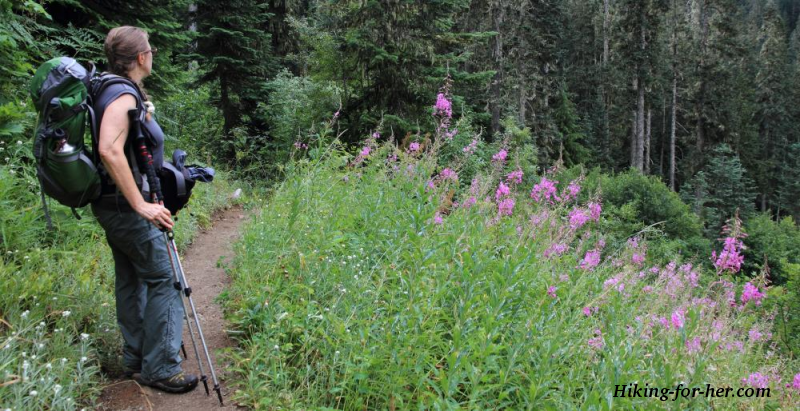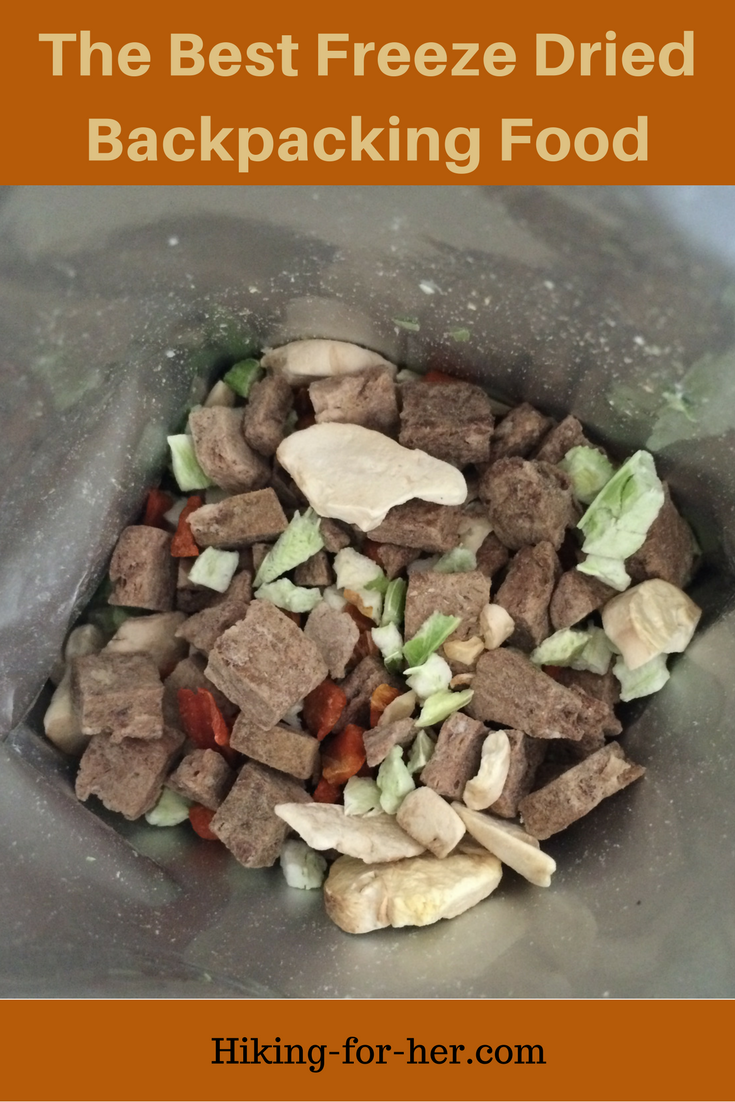Best Freeze Dried
Backpacking Food For Hungry Hikers
(is there any other kind?)
By Diane Spicer
Freeze dried backpacking food is one of your options for lightening up your pack on a multi-day hiking trip while paying attention to your enormous hunger levels.
But it's not necessarily the best option.
Here's a quick review of why freeze dried backpacking menus are so popular.
Then you can decide if this type of trail food is for you.
Why freeze dried backpacking food?
Any food that is "freeze dried" is going to weigh a lot less than it did originally.
The technique of freeze drying pulls out the heavy water molecules, leaving nutrients behind in the remaining organic material.
The technical terms for freeze drying include:
- lyophilization
- cryodessication (just a fancy way of saying that coldness is used to dry out something)
Carrying food that weighs less is what backpacking is all about. Ditch the water on the trail, and then add it back once you set up camp near a surface water source.
Hiking tip: Always know where your water source is going to be, by studying maps and satellite images of your intended destination.
And know how to clean it up.
Another bonus of freeze dried hiking food: Microorganisms can't degrade the food, and you can leave it at room temperature in your pack or resupply kit for a long, long time
You'll be amazed!
Amazingly, the flavor and smell of the food is pretty much retained, which means rehydrating your meal over a stove is going to involve all of your senses.
That makes for a pleasant dinner experience after a long hard day on the trail.
- It also means that food odors can call in predators or scavenging nuisance animals like rodents and raccoons.
- Keep a clean camp!
Don't confuse freeze dried
with dehydrated backpacking food
There's a second way to remove water from food, and thus lighten it up: dehydration.
Many hikers use a home dehydrator to make backpacking menus for multi-day trips.
This follows the time honored tradition of drying food in the sun's heat, but makes trail food preparation more convenient on your own kitchen counter top.
But what you need to know about this method is that dehydrated food will not have all of the nutrients, aroma and savory-ness of freeze dried backpacking food.
- Why not? Because it takes longer and uses heat to achieve its goal. You'll lose some of the important flavor molecules.
On the other hand, dehydrated backpacking food will be even more compact and cost a lot less when you use this technique at home.
- Freeze drying backpacking food at home is not easy, and thus not widely used as a method for hiking food preparation.
One more downfall of dehydrated food: It takes a lot longer to rehydrate, as in hours rather than minutes if you only have access to cold or tepid water.
However, if you have the right backpacking stove with adequate fuel, you can re-hydrate either type of backpacking food within 10 minutes using hot water.
And don't confuse freeze dried with fresh dried!
Never heard of fresh dried food?
It's a new technique to preserve more of the nutrients while creating a lightweight nutritious supplement for backpacking menus.
The Blendfresh Company is pioneering this approach to preserve most of the nutrients, vitamins, minerals and enzymes of fresh food.
Phytonutrients, if you'd like the technical term.
- This is important for long distance hiking, because of the wear and tear on the muscles, joints and cardiovascular system.
Try some of their lightweight blends to maximize your nutrition and boost the flavors in your freeze dried backpacking food.
Can you eat freeze dried food without water?
Good question for a backpacker who is conscious of the weight of water on her back!
The answer is no, you will need water to reconstitute this type of food. If you attempt to eat it dry, it will pull water from your body as it digests and you'll wind up dehydrated - not a good idea.
This brings up the necessity of the right quantity of clean water to use in preparing your meals (see link above).
- And read these tips on how to organize a backpacking kitchen with the right essentials, so you're prepared to haul and store water after you treat it.
What is the best freeze dried food?
Brands to consider
Every hiker has unique taste buds, and what is incredibly yummy and satisfying for me might not make it onto your "favorite trail foods" list for the best freeze dried backpacking or camping food.
But I'll go out on a limb here and tell you why I prefer this brand: Backpackers Pantry from REI (a reputable gear coop) which offers a percentage discount when you buy in bulk.
Which you should, to maximize cost savings and mix up your trail menu for the benefit of your taste buds.
- Bored taste buds are something to be avoided at all costs on a backpacking trip!
So why Backpackers Pantry for my backpacking trips?
- I don't have time to dehydrate a lot of backpacking food.
- I don't have space for a dehydrator in my minimalist kitchen.
- I'd rather spend a bit more for more flavorful and nutritious, yet still lightweight and compact, backpacking food.
- This company adds vitamins and avoids artificial flavorings & preservatives.
- I like the variety of offerings, with a few absolute favorites:
- Katmandu Curry
- Santa Fe Style Rice & Beans with Chicken
- My review of this brand's freeze dried backpacking food
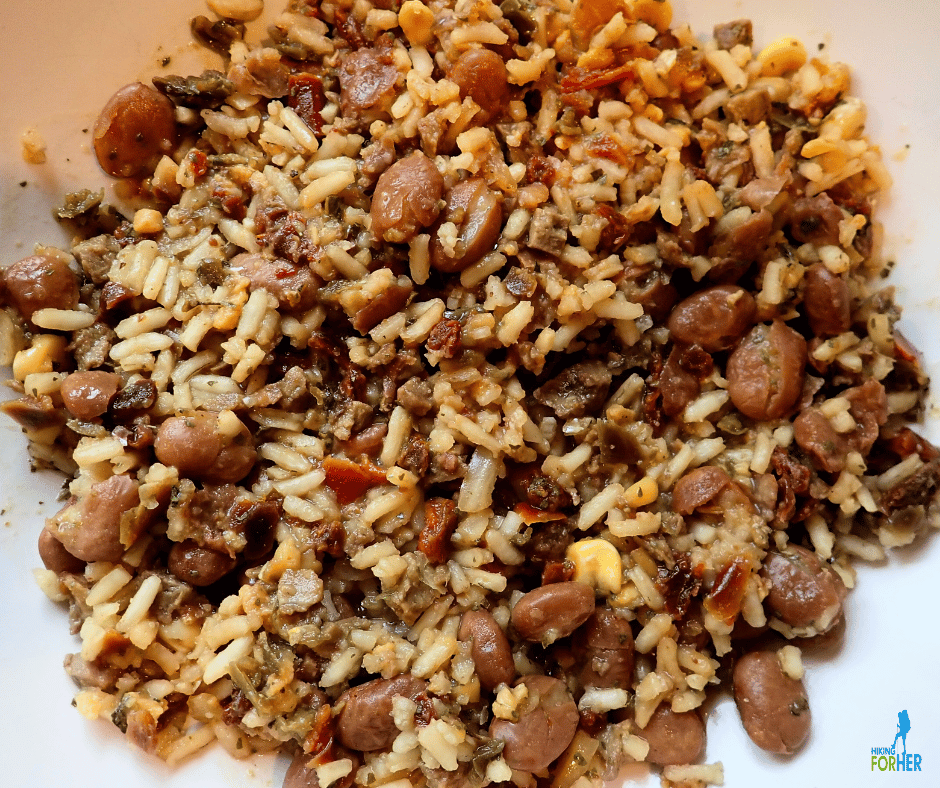
Another good choice for freeze dried
backpacking and camping meals
Mountain House is a company that has been around for over four decades.
I've used it for that long, too!
Here's my recent review of some of their backpacking meals.
And here's where you can select your favorite entrees for an upcoming outdoor adventure.
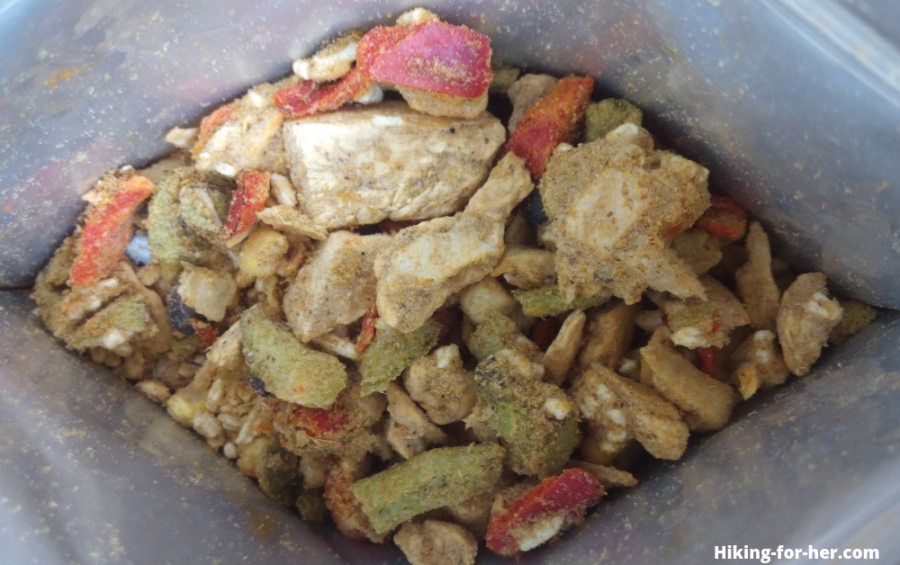
Gluten free options
If you need to go gluten free, Backpacker's Pantry has an assortment of options just for you (including my fave, the curry!).
- Be sure to select "gluten free" to sort through the entrées on their user friendly website.
For exact, detailed information about ingredients, read their list of nutritional information here.
All of the common allergens (milk, peanuts, wheat, soy, etc.) in each entree are noted, so you can avoid anything you'd rather not ingest.
I don't use their breakfast entrées because I'm always in a big hurry first thing in the morning, so I don't have any feedback on those.
But I never skip dessert, and can highly recommend their version of Astronaut Ice Cream, which brings back childhood memories.
Don't let the sugar scare you - carbohydrates are a backpacker's best friend!Probably not so much in your off trail life, though.
Mountain House has clear labeling to make it easy to spot their gluten free options, too.
More options for backpacking
prepared meals
Recently, I discovered another gluten free, "real food" option for backcountry meals: Wild Zora (old name: Paleo Meals To Go).
- Read why it has risen to a top spot on my list of freeze dried backpacking food.
- Then check out their selection of backpacking meals, soups and bars here.
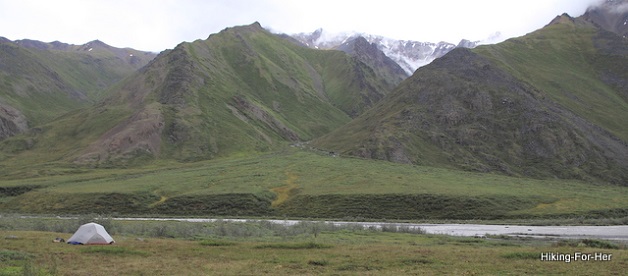 When you're out here, you want good food!
When you're out here, you want good food!
Are freeze dried meals healthy?
Depends on what your definition of "healthy" might be!
The processing of food will always strip away some nutrients.
But as a backpacker you want lightweight, easy to handle, non-spoiling food on your trip.
And that means compromising on the nutrition of whole foods in order to attain your base weight while satisfying your taste buds and your body's requirements for fuel.
Here's what to do about the question of nutrition:
Each backpacking freeze dried meal you purchase will have nutrition information prominently displayed on the package.
If you're concerned about a particular nutrient, you can calculate your daily intake and then get creative about ways to supplement your hiking nutrition.
- To start on your journey into the wonderful world of nutrients for hikers, go here.
- Or use these tips specific to backpackers.
Supplement your freeze dried
backpacking food
If nutrition isn't your main concern, maybe taste and palatability are. After all, you're going to be away from a fresh food supply for awhile.
As you get to know each backpacking food brand, you will have your own answer to the all important question: what does freeze dried food taste like?
Then you can begin to hack the flavors and add some taste to suit your own palate.
Examples of personal preferences
in backpacking food
Always carry a small spice selection to jazz up your freeze dried selections:
- curry
- garlic powder
- oregano
- basil
- ginger
- cayenne
This is in addition to bringing salt and pepper to flavor your meals.
Backpacking food and your mood
Pack some lightweight but powerful food to modulate your mood as you hike.
- Think ahead to include these simple, natural solutions to problems that all backpackers face on the trail.
Enjoy the process of discovery
as you explore the best freeze dried backpacking food!
Invest some time into the necessary task of finding your trail favorites for an upcoming backpacking trip.
- Use your trail journal to record your thoughts during the trip, and tweak your repertoire of backpacking favorite meals until you've got it dialed in just right.
Freeze dried hiking food isn't cheap, but it's not possible to make it yourself at home.
That's where a food dehydrator comes into play.
So decide for yourself what's most important to you: cost, convenience, nutrient levels, or flavor.
Then select from dehydrated or freeze dried backpacking menus.
If you're still wondering what is better, freeze dried or dehydrated food, re-read the information above. It comes down to personal choice, availability of time and water, affordability and your own unique taste buds.
One last trail tip about good
backpacking food choices
Realize that you're going to be hugely hungry on a backpacking trip.
Serving sizes on pre-packaged backpacking food should be treated with skepticism, as in "I can eat the WHOLE thing by myself."
Because you can (and will) devour each and every morsel of your freeze dried backpacking food entrée.
Before you go, check out how to stay full on the trail!
Home page > Backpacking Food >
Best Freeze Dried Backpacking Food
Some of the links on this page and elsewhere on Hiking For Her are affiliate links.
When you purchase through the link, a small percentage of the purchase price allows HFH to continue offering free hiking tips on this website.
Do you pay extra?
Absolutely not!
But it's a win-win: you get trail worthy products like freeze dried backpacking food, and HFH can keep the electrons flowing. Thanks for your support!
|
I get emails all the time about what I wear, eat, carry and love to use on the trail. That's
why I provide affiliate links to you: the best gear that I use myself and have seen used by other hikers is instantly
available for your consideration, and the gear company sends a few
pennies per dollar to this reader-supported hiking website. There is no added cost to you! Everyone ends up a winner: Great gear for you, strong gear companies, and more free hiking tips for everyone. Thanks very much for your support. It's warmly and sincerely appreciated. It also helps send these hiking tips to all your virtual trail buddies around the globe. |
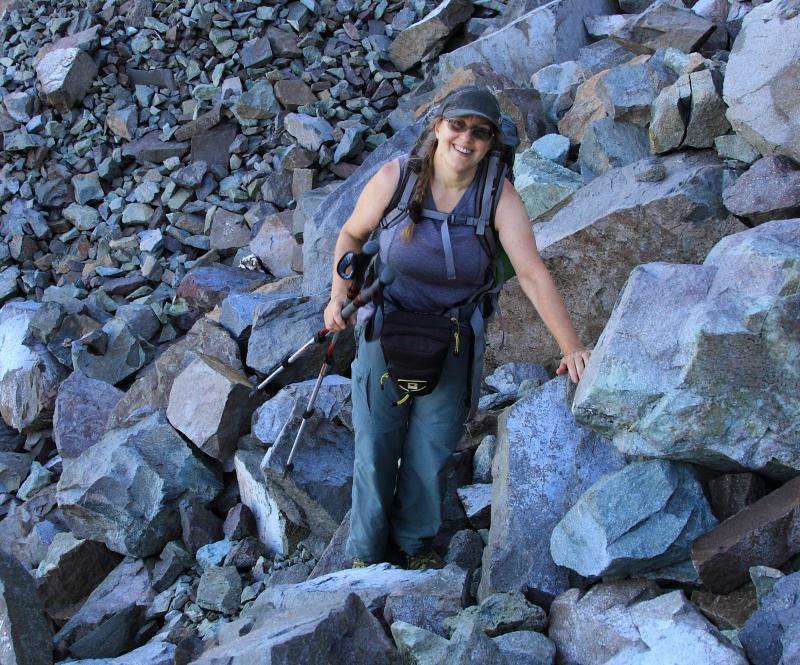 |

